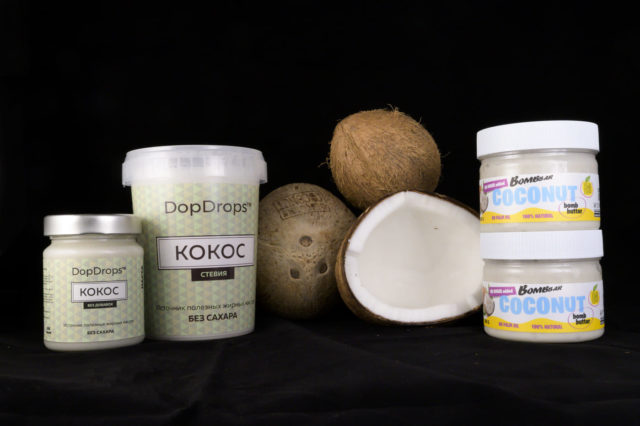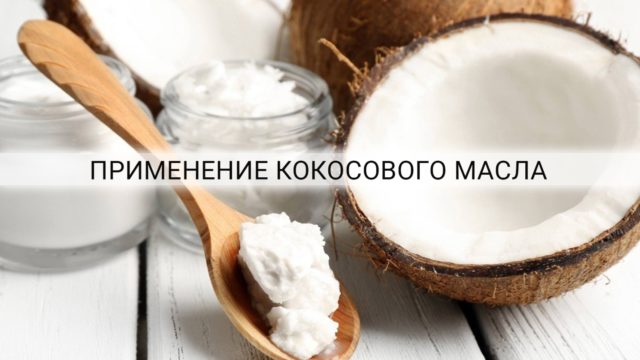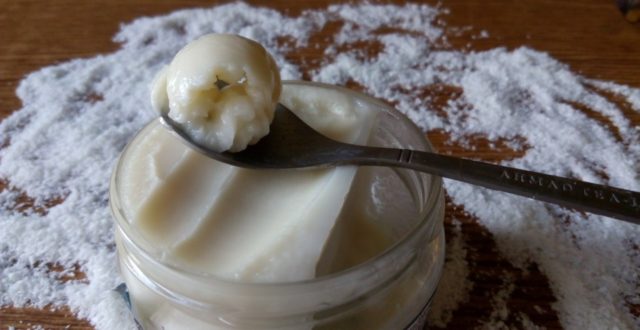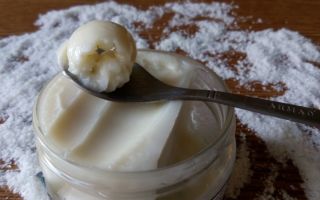Content
The benefits and harms of coconut butter should be assessed prior to inclusion in the diet. Thanks to its pleasant taste, it is loved by both adults and children. People who have not eaten coconut pulp before should be careful not to experience allergic reactions or intolerances. It is important to make sure that there are no contraindications for admission.
What is coconut butter
Coconut paste is a creamy substance that is obtained during the processing of the pulp of the fruit of the same name. It is a natural product with a pleasant sweetish taste.
Some people call coconut butter butter or spread. She received this name because of the high fat content. When stored in warm rooms, it can separate into butter and pulp. Therefore, it is advisable to mix it before use so that it becomes a homogeneous consistency.
The texture of this product is similar to coconut flakes swollen in water mixed with candied honey. If no sweeteners were added during the production, then the taste of the pasta will not be cloying, but pleasant, natural. At temperatures below + 24 ° C, it hardens.
Coconut paste composition
Coconut is a source of vitamins, minerals, dietary fiber that the body needs. The paste is made from its pulp, so it contains the same components.
For the human body, it is a source of the following substances:
- vitamins E, K, PP, C, group B;
- minerals selenium, zinc, copper, manganese, iron, phosphorus, magnesium, calcium, potassium;
- fatty acids, including saturated, mono - and polyunsaturated;
- fiber;
- essential amino acids.
Coconut pulp is rich in antioxidants. Analysis of the composition shows that lauric, caprylic and capric fatty acids prevail in the paste.

Nutritional value and calorie content
The calorie content of coconut paste is 606 kcal per 100 g. It contains:
- 7.3 g carbohydrates;
- 6.9 g protein;
- 55 g fat;
- 1.7 g of ash.
The biological value of proteins included in the composition is determined by the balance of their amino acid composition. They contain:
- isoleucine + leucine;
- lysine;
- methionine + cystine;
- threonine;
- tryptophan;
- valine;
- phenylalanine + tyrosine.
Also, the nutritional value of the product is influenced by the antioxidants, fiber, triglycerides, oil extracts contained in its composition.
Why is coconut butter useful?
High-quality coconut paste is made from the pulp of the fruit of the same name without adding other components. Therefore, the composition of these products and the content of substances necessary for the body does not differ.
When consumed regularly, the benefits of sugar-free coconut butter cannot be overestimated. It has a positive effect on the functioning of the cardiovascular system, helps to reduce the concentration of cholesterol and reduce the risk of developing atherosclerosis. But these are not all of its advantages.It is recommended to use oil made from coconut for the following purposes:
- prevention of the development of eye diseases, decreased visual acuity;
- constipation treatment;
- elimination of bloating;
- weakening the severity of inflammatory processes;
- prevention of gallbladder diseases;
- normalization of the functioning of the digestive system;
- treatment of diseases of the kidneys and other organs of the urinary system;
- increased libido;
- strengthening bones and tooth enamel;
- normalization of the thyroid gland.
But this is not a complete list of the beneficial properties of coconut paste. It is a source of protein and is therefore recommended for athletes looking to build muscle.
Due to its anti-inflammatory effect, this product is recommended for diseases of the respiratory tract, genitourinary system, joints, ENT organs. It is indispensable for people who take antibiotics. Under the influence of the substances contained, the likelihood of the body becoming accustomed to antimicrobial drugs is reduced.
Why is coconut butter useful for women
You can saturate the body with vitamins, amino acids and other essential substances if you include coconut oil in your daily diet.

Coconut paste has the following effect on the female body:
- activates metabolism;
- improves the condition of the skin, hair, nails;
- prevents the development of diseases of the genitourinary system;
- cheers up;
- eliminates many symptoms of vitamin deficiency;
- has a positive effect on the work of the reproductive organs.
In the absence of contraindications, you can use coconut paste during pregnancy. But it's better to include it in the menu at the planning stage. So you can saturate the body with folic acid and prevent a number of fetal pathologies that are caused by a deficiency of this element.
Due to the content of medium-chain fatty acids (lauric, caprylic, capric), when coconut oil enters the body, metabolism starts. It promotes fat burning and weight loss.
How to make coconut butter
Coconut paste is produced from nut pulp on an industrial scale. But you can do it yourself at home. For cooking you will need:
- 5 cups coconut flakes or flakes
- 1 tbsp. l. coconut oil;
- by ¼ h. l. salt, vanillin (optional).
Make a pasta using a food processor (requires an S-shaped attachment) or a blender. All ingredients are poured into a container and stirred until the chips are crushed and the mass becomes pasty in consistency. The cooked butter should look like softened butter interspersed with coconut pulp.
How to take coconut butter
You can use the mass obtained from the pulp of coconut as butter, a substitute for yogurt, milk, cream for cakes and pastries. It is added to cereals, cottage cheese, quick breakfasts. Pasta goes well with waffles, crispbread, desserts. But these are not all the ways to use coconut butter. Some people prefer to consume it neat.
Milkshakes and smoothies are made on the basis of coconut oil. It is added to baked goods and used to make candy. It goes well with dried fruits and nuts.
You can make a cocktail if you mix 100 ml of milk, 200 ml of yogurt and 2 tsp in a blender. coconut paste.Beat it until smooth and pour it into glasses. You can decorate the cocktail with fresh raspberries.
Nutritionists advise using this product only in the first half of the day. It is important to have time to spend the calories received. The recommended daily dose is no more than 2-3 tbsp. l. For problems with excess weight - 1-2 tbsp. l.

The recipe for making sweets with a taste reminiscent of Rafaello is popular. You can make them sweeter by adding condensed milk or powdered sugar. Balls are formed from the mass, almonds are placed inside, and rolled on top in fine coconut flakes.
It is advisable for women during lactation to consume it in limited quantities. Coconut paste is not contraindicated for breastfeeding, but it is important to ensure that the child does not have an allergic reaction.
Harm of coconut paste
Adults and children who have not eaten coconuts before should be careful when using the oil for the first time. There is a risk of developing intolerance or allergy reactions to this product.
Nutritionists advise people with a tendency to be overweight to consume coconut oil in limited quantities. It has a positive effect on metabolism and prevents sharp jumps in blood sugar, but due to the increased calorie content, it can lead to weight gain.
It is undesirable to include coconut oil in the diet of children under 3 years old. At this age, it is desirable to give only those fruits that grow in the region of residence. The digestive system of children is still imperfect, therefore allergies may develop to exotic fruits and nuts.
People with diarrhea and other disorders of the gastrointestinal tract should refuse coconut paste. Its use can provoke an exacerbation of diseases of the digestive system.
How to choose and store coconut butter
It is better to buy coconut mass in stores or specialized points of sale. So you can buy a natural product, and not a fake. When choosing, it is important to pay attention to the composition. Various additives (thickeners, emulsifiers, dyes and other preservatives) should not be in it.
The product retains all useful properties if it is kept in a tightly closed glass container. It is best to store it at temperatures from 0 to + 25 ° C. In warm conditions, the possibility of stratification of the paste is allowed. If this happens, the mass should be mixed until it becomes homogeneous in consistency again.
Conclusion
The benefits and harms of coconut paste should be considered when drawing up a diet. This product saturates the body with the necessary amino acids, fats, minerals, improves health and increases resistance to infections. But with allergies or intolerances, the harm will be stronger than the benefits, so you will have to refuse to use the paste.

